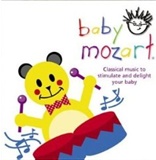
Baby Einstein Baby Mozart Music
by Baby Einstein
-------Watch Music Video Here------
Music Comments & Discussion (2)

Baby Einstein puts out many early learning products to help children develop good learning skills from the cradle up. Many of their CDs and DVDs can be irritating in the extreme to the well-meaning parents who dutifully play them daily for their children. However, there is at least one exception: their "Baby Mozart" CD.
Baby Mozart doesn't explain what a banana is or count to twenty in a foreign language. It's just music; some of Mozart's more famous pieces on CD. The orchestral arrangements have just the right touch for Mozart's music. The songs are lively enough that even the littlest children can enjoy them, while at the same time restful enough that adults like them, too.
Yes, adults like them, too! Baby Mozart's fifteen tracks double as a lullaby for your children and a relaxation CD for yourself. This truly is a CD that children and adults can both enjoy.
Baby Mozart includes, among other things, all three movements of Mozart's famous Sonata in C for Piano, and the Papageno Arias Nos. 2 and 20, from The Magic Flute. And if those names don't sound familiar to you, don't worry about it; as soon as they come on, you're almost certain to recognize the melody of the best-known classical music in American culture.
Baby Mozart is well worth purchasing. No matter how many times the kids want to listen to it, you won't get tired of hearing it. In fact, they may get tired of listening to it before you do!
Baby Mozart doesn't explain what a banana is or count to twenty in a foreign language. It's just music; some of Mozart's more famous pieces on CD. The orchestral arrangements have just the right touch for Mozart's music. The songs are lively enough that even the littlest children can enjoy them, while at the same time restful enough that adults like them, too.
Yes, adults like them, too! Baby Mozart's fifteen tracks double as a lullaby for your children and a relaxation CD for yourself. This truly is a CD that children and adults can both enjoy.
Baby Mozart includes, among other things, all three movements of Mozart's famous Sonata in C for Piano, and the Papageno Arias Nos. 2 and 20, from The Magic Flute. And if those names don't sound familiar to you, don't worry about it; as soon as they come on, you're almost certain to recognize the melody of the best-known classical music in American culture.
Baby Mozart is well worth purchasing. No matter how many times the kids want to listen to it, you won't get tired of hearing it. In fact, they may get tired of listening to it before you do!

There is a whole range of these CDs, to mention only a few other titles "Baby Einstein. Baby Bach", "Baby Einstein. Baby Neptune".
You can play this CD even before the baby is born, it will get pick up the sound - somehow muffled, but yes it can absorb it and hear! (Depending on the development stage of the fetus!)
In children and in grown-ups, the brain (subconscious mind) will analyse the music and see what it can make of it, connecting many new neurons and nodes in the brain. It is said to be especially effective in the early developmental years of children to stimulate their analytical mind and also help with a more balanced development. Please do not underestimate the relaxing effects it may have on you - especially in our stressed and rushed world, in the rat-race we are in day-in day-out.
It can make a very suitable launchpad to start learning how to appreciate classical music.
Don't start with the heavy stuff. Start off easy and then look which tracks you like most and get something in this line the next time you select a classical music CD.
W.A. Mozart, Leopold Mozart (his father), JS Bach, CPE Bach, early works of Ludwig van Beethoven, are also suitable to start you off, perhaps mixed with a little Schubert, Vivaldi, or even Paganini.
Another approach would be getting some music played by James Last, Herb Albert or Franz Lambert. There may be various free samples to download, too.
Or another fun and interesting way would be to search for some free MIDI classical music pieces. MIDI is the most compact music notation file format to store digital information possible. So the downloading goes quick and does not stress your line or storage capacity! It actually stores the note's pitch, the duration and the volume information for every sound played and some other control parameters. You could compare this with the description of how to actually play the music. (Similar to a recipe for baking a cake.) At playback time, the software controlling the sound card then actually uses this instructions (recipe) to make the near perfect music out of it again. The better your sound card the better the results will be. Please bear in mind that early recordings of MIDI files do not have the latest enhancements to control all parameters of the full MIDI control set. The "Dynamics" and "After-Touch" effects, for instance only came much later. This is an enhancement for touch-sensitive keyboards to be able to give a better dynamic volume control and also sound-variation of the pitch depending on the force of the pressure of the respective key, while the note is played, similar to the "Wah-Wah effects" of an electric guitar.
- OOPS! - Now I have totally drifted of the TOPIC!
(Most likely I will have failed this TEST! :LOL:
So let me expand on the MIDI topic in an separate Article in the category Music)
You can play this CD even before the baby is born, it will get pick up the sound - somehow muffled, but yes it can absorb it and hear! (Depending on the development stage of the fetus!)
In children and in grown-ups, the brain (subconscious mind) will analyse the music and see what it can make of it, connecting many new neurons and nodes in the brain. It is said to be especially effective in the early developmental years of children to stimulate their analytical mind and also help with a more balanced development. Please do not underestimate the relaxing effects it may have on you - especially in our stressed and rushed world, in the rat-race we are in day-in day-out.
It can make a very suitable launchpad to start learning how to appreciate classical music.
Don't start with the heavy stuff. Start off easy and then look which tracks you like most and get something in this line the next time you select a classical music CD.
W.A. Mozart, Leopold Mozart (his father), JS Bach, CPE Bach, early works of Ludwig van Beethoven, are also suitable to start you off, perhaps mixed with a little Schubert, Vivaldi, or even Paganini.
Another approach would be getting some music played by James Last, Herb Albert or Franz Lambert. There may be various free samples to download, too.
Or another fun and interesting way would be to search for some free MIDI classical music pieces. MIDI is the most compact music notation file format to store digital information possible. So the downloading goes quick and does not stress your line or storage capacity! It actually stores the note's pitch, the duration and the volume information for every sound played and some other control parameters. You could compare this with the description of how to actually play the music. (Similar to a recipe for baking a cake.) At playback time, the software controlling the sound card then actually uses this instructions (recipe) to make the near perfect music out of it again. The better your sound card the better the results will be. Please bear in mind that early recordings of MIDI files do not have the latest enhancements to control all parameters of the full MIDI control set. The "Dynamics" and "After-Touch" effects, for instance only came much later. This is an enhancement for touch-sensitive keyboards to be able to give a better dynamic volume control and also sound-variation of the pitch depending on the force of the pressure of the respective key, while the note is played, similar to the "Wah-Wah effects" of an electric guitar.
- OOPS! - Now I have totally drifted of the TOPIC!
(Most likely I will have failed this TEST! :LOL:
So let me expand on the MIDI topic in an separate Article in the category Music)
Post Comment - Let others know what you think about this Music
About this Music
No Description Available.Genre: ChildrensMedia Format: Compact DiskRating: Release Date: 7-MAY-2002Of all the reasons you'll click the Add to Shopping Cart button next to Baby Einstein's Baby Mozart--and there are many--the best one is that playing this record for babies doesn't feel weird. Instead of subjecting tiny, tender ears to the kind of Mozart that can make adult classical fans wilt when tackled by a maestro who means business, this is Mozart lite, mixed and mastered by a dad, Bill Weisbach, who's clearly hung around for his share of crib-side cooing. The slightly tinny sound of a child's piano sweeps the sting out of Piano Sonata in B Flat's third movement; the first movement of Concerto for Flute and Harp in C floats by, birdlike; variations on "Ah vous dirai-je, Maman" translate to a fancy-sounding (but adorable) "Twinkle, Twinkle"; and Piano Sonata in F's third movement snuggles so deeply into its childlike setting that if you close your eyes, you'll see a pastel parade of animals floating by overhead. Other pieces (more aptly called fragments, since only one track stretches beyond the three-minute mark), like Symphony No. 41's fourth movement, wander into more robust Mozart territory, but it's here the claims about classical music enhancing young kids' abstract reasoning skills and spatial intelligence crystallize. Babies strapped in for a roller coaster of sounds that gracefully dips, swerves, and high-jumps like this version, do have to process what they're hearing somehow (and a case could be made that the instruments Weisbach's chosen--the vibraphone, glockenspiel, and music box among them--make it more appealing for them to do so). Followers of Julie Aigner-Clark's Baby Einstein empire, many of whom opted out of the fan club once Disney bought the company in 2001, won't trip over a single Mickey Mouse-ified sound here. This is pure, plugged in, and muted Mozart, and if it doesn't make your baby smarter, it'll at least sound awfully sweet issuing from your nursery's speakers. --Tammy La Gorce
Report Abuse for this page, if inappropiate
Music on the site is added by members. You can add Music too. Click here to add one.
 nomi ruiz: see the light
nomi ruiz: see the light Mahadewi: Satu satunya Cinta
Mahadewi: Satu satunya Cinta Deftones: White Pony
Deftones: White Pony Cadmium, Rosendale: No Friends
Cadmium, Rosendale: No Friends Beth Hart: Cought Out In The Rain
Beth Hart: Cought Out In The Rain